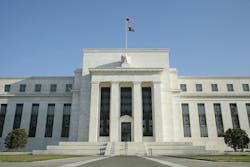US Fed Officials More Concerned With Inflation Risk Than Jobs: Minutes
A majority of Federal Reserve officials found that risks surrounding U.S. inflation outweighed those to employment, minutes of a recent policy meeting showed -- underscoring a central bank divide over the effects of President Donald Trump's tariffs.
Attendees of the late July meeting saw challenges to both sides of the Fed's dual mandate of maintaining stable prices and maximum employment, as they mulled the right time for changes to interest rates, according to the minutes released Wednesday.
But "a majority of participants judged the upside risk to inflation as the greater of these two," the report added.
Only "a couple of participants considered downside risk to employment the more salient" one.
This points to differences in the central bank's rate-setting Federal Open Market Committee, which saw two dissents in July from Fed governors Christopher Waller and Michelle Bowman.
Overall, policymakers voted to keep interest rates unchanged at a range between 4.25% and 4.50%, despite Trump's repeated calls for the independent central bank to slash rates.
But Waller and Bowman favored a cut of 25 basis points, with Bowman flagging a preference to hedge against further weakening in the economy and "the risk of damage to the labor market."
The minutes showed Wednesday that a couple of officials preferred to lower interest rates, indicating that the two dissenters appear not to have been joined by others.
These policymakers judged that tariffs were unlikely to have persistent effects on price hikes, while flagging concern on labor market conditions.
Elsewhere, officials gauged that growth of economic activity cooled in the first half of this year, the minutes said.
Tariff effects "were becoming more apparent in the data, as indicated by recent increases in goods price inflation," the minutes showed.
Several participants also noted that inflation exceeded the Fed's 2% target for a prolonged period. This raises the risk of longer-term inflation expectations "becoming unanchored," particularly if higher tariffs have lingering effects on prices.
Many in the meeting also noted it could take time for the full effects of steeper duties to be felt in consumer costs.
"The labor market will be the swing factor on whether the Fed cuts interest rates in September or not," said Economist Ryan Sweet of Oxford Economics.
"It's likely the August employment report and revisions will be the determining factor," he added.
"Odds are rising that the Fed cuts sooner than we anticipate."
All rights reserved ©2025 Agence France-Presse
About the Author
Agence France-Presse
Copyright Agence France-Presse, 2002-2025. AFP text, photos, graphics and logos shall not be reproduced, published, broadcast, rewritten for broadcast or publication or redistributed directly or indirectly in any medium. AFP shall not be held liable for any delays, inaccuracies, errors or omissions in any AFP content, or for any actions taken in consequence.
